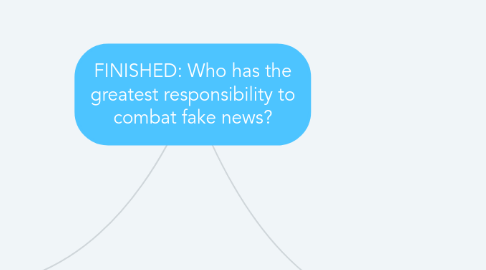
1. Social media companies have the greatest responsibility to combat the spread of fake news.
1.1. Because social media companies have access to software that can filter out fake news articles and websites.
1.1.1. Matthew A. Baum, a public policy professor at Harvard University, responds to the fact that 10,000 Google employees are hand flagging fake news by stating the process Google is using is too time intensive, and it should “evaluate websites as a whole” (Grossbart).
1.1.1.1. Is the loss of money the reason Facebook has not limited fake news even though they have the ability?
1.1.2. Facebook has the capability to limit fake news because it can already “effectively block content like click-bait articles and spam from its platform by tweaking its algorithms, which determine what links, photos and ads users see in their news feeds” (“Digital”).
1.1.2.1. I wonder why Google doesn’t find a more efficient way of eliminating fake news?
1.1.3. The New York Times Editorial Board feels if Facebook can decide “to show more posts from friends and family members in users' news feeds and reduce stories from news organizations...surely its programmers can train the software to spot bogus stories and outwit the people producing this garbage” (“Digital”).
1.1.3.1. Social media companies have the capability to block fake news.
1.1.3.2. Fake news is easily spread using social media, so social media companies have a responsibility to fight fake news ("Digital").
1.2. Because social media companies can cut financial ties with fake news websites
1.2.1. The New York Times Editorial Board reported that Facebook, “would no longer place Facebook -powered ads on fake news websites, a move that could cost Facebook and those fake news sites a lucrative source of revenue” (“Digital”)
1.2.1.1. Stopping the spread of fake news will cause Facebook to lose money
1.3. Because social media companies can delete illegitimate bot accounts that spread fake news.
1.3.1. In "Fighting Fake News" Sarah Grossbart reports that Facebook has only recently deleted several thousand accounts, but knew back in “2013... it could have as many as 138 million phony accounts” (Grossbart).
1.3.1.1. Meaning, Facebook had several years to address the presents of bots on it’s site, but chose not to take action until 2017.
1.3.1.2. Social media companies are not doing enough to fight fake news (Grossbart).
2. Social media users have the greatest responsibility to combat the spread of fake news.
2.1. Because social media users can check the credibility of the source.
2.1.1. S. Shyam Sundar, a professor at Pennsylvania State University, studied “studying the psychology of online news consumption for over two decades” and found that “online news readers don’t seem to really care about the importance of journalistic sourcing” (Sundar).
2.1.1.1. Users believe fake news and share it with others (Sundar).
2.1.1.2. Sourcing is important because people need to check to see who wrote the article and where it comes from to determine if it is credible.
2.1.1.2.1. If a story is not important, people remember it based on the site they found it on. Sundar explains “people say they got their news from “sources” that don’t create and edit news articles: Verizon, Comcast, Facebook and, by proxy, their friends” (Sundar).
2.2. Because social media users can educate themselves and each other about media literacy.
2.2.1. Anzalone, an expert in News Literacy, discusses the importance of “valuing and seeking truth--and knowing how to find it” in response to limiting the spread of fake news (Grossbart).
2.2.1.1. Valuing and knowing how to find the truth is precisely how people can bring about the end of fake news.
2.2.2. Jonathan Anzalone of the Center for News Literacy at Stony Brook University in New York suggests that the “best way to stop fake news may be educating people to be skeptical about what they read” (Grossbart).
2.2.2.1. This idea can be achieved through a variety of means including classes, teachers assigning research projects, parent involvement, and discreet messages to friends on social media sites.
2.2.2.2. People need to be in charge of stopping fake news because it is too big of a problem for social media companies to do it alone (Grossbart).
2.3. Because social media users can refuse to share articles that contain fake news
2.3.1. When a social media user believes a fake news article it "can go viral, spreading via social media for millions without proper vetting and fact-checking" (Sundar).
2.3.1.1. This can happen very quickly because all a user has to do is click a button to be part of the problem.

